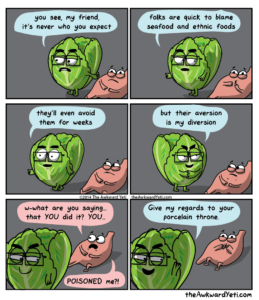Sorenne had scooter day today at school.
It’s all part of the active lifestyle thingy the school does – and our school is really good at it, because driving just doesn’t makes sense for the locals – but Sorenne’s scooter has seen better days and now she’s an avid bike rider.
 She still got a sausage on white bread – breakfast of champions – and some fruit for her efforts.
She still got a sausage on white bread – breakfast of champions – and some fruit for her efforts.
The fruit this morning consisted of watermelon and orange slices. I asked the co-ordinator if she considered rockmelon — otherwise known as cantaloupe – and she said, I did last week, but then just didn’t.
And then I heard the news last night.
Food safety Doug, who ruins all the fun for the other kids, gave her a big thumbs up.
Later today, it was confirmed that at least 86 people in Australia have contracted an “exceedingly rare” form of salmonella linked to the consumption of rockmelon.
Red Dirt Melons – a Northern Territories-based supplier – is recalling its rockmelons after Food Standards Australia New Zealand (FSANZ) launched an investigation into a spike in salmonella cases in a number of Australian states.
Whole rockmelons, as well as pre-sliced melons, can carry the bacteria, and should be avoided, health authorities said.
There have been 86 reported cases of Salmonella Hvittingfoss (S. Hittingfoss) nationally – 43 cases in NSW – in the two weeks to August 1.
It’s a sizeable jump compared to the two cases per month on average in NSW over the last five years.
The people affected by the recent outbreak range in ages, but 49 per cent of cases in NSW were children under five years old.
Victorian authorities are investigating eight suspected cases of salmonella poisoning that may be linked to the fruit.
Red Dirt Melons have begun a recall of their rockmelons after the Salmonella bacteria was detected by health authorities in South Australia on August 2.
Woolworths removed all Red Dirt rockmelons from its stores on Monday evening when they were told of the possible link, a spokesman for the supermarket giant said.
The chain has also suspended any future supply from Red Dirt until the food authorities provide further guidance.
Rockmelons could become contaminated with salmonella due to water contamination, contact with fertiliser, pests or animals, or if the rockmelons were not cleaned properly before sale, The NSW Food Authority said.
Rockmelons have been linked to salmonella poisonings in the past, including in the US in the 1950s, 1960s and in 2002.
The Hvittingfoss strain turned up in Sydney and Adelaide in the past few weeks, according to the Australian Melon Association. Food Standards Australia New Zealand says authorities are investigating and has warned pregnant woman, infants and the elderly not to eat the fruit.
Industry, state and federal authorities are expected to discuss the issue in a teleconference on Wednesday afternoon.
“We want more details so consumers can find out which parts of Australia are not impacted,” melon association spokeswoman Dianne Fullelove told AAP.
“We would like to have our supply chain moving. At the moment it’s virtually stopped.”
Nicevmessage of safety and compassion.
The fruit has previously been linked to salmonella, with 50 cases linked to the Saintpaul strain reported in NSW in 2006. In America in 2011, rockmelon contaminated with listeria was linked to more than 20 deaths (33 – dp).
This chart of Salmonella-in-cantaloupe outbreaks will be updated in the next couple of days. Cantaloupe Related Outbreaks

 NSW Health reports there are now 13 sick and 4 dead from Listeria linked to rockmelons (cantaloupe) from a farm in Nerico, NSW.
NSW Health reports there are now 13 sick and 4 dead from Listeria linked to rockmelons (cantaloupe) from a farm in Nerico, NSW.











